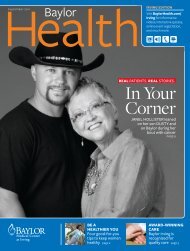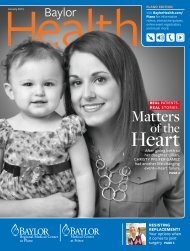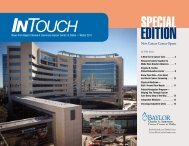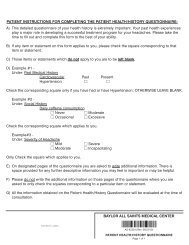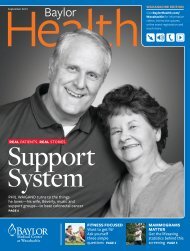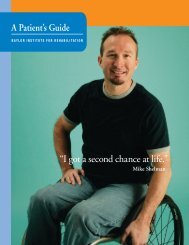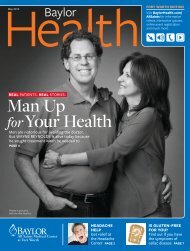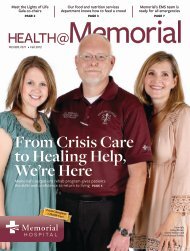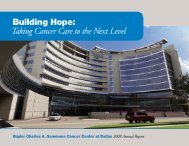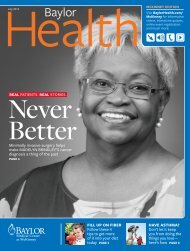16<str<strong>on</strong>g>Focused</str<strong>on</strong>g> <strong>on</strong> specialized careBreast and Ovarian Cancer:Patient Resp<strong>on</strong>ses to Genetic Testingby Becky Althaus, PhDDr. Becky AlthausFor many years, <strong>the</strong> <strong>Baylor</strong> Samm<strong>on</strong>s Cancer Center has offered a Hereditary Cancer RiskProgram for individuals c<strong>on</strong>cerned about developing breast or ovarian cancer. Factors suchas family history, pers<strong>on</strong>al history, age, and reproductive history tell part of <strong>the</strong> story. Laboratoryanalysis of <strong>the</strong> BRCA1 and BRCA2 genes that c<strong>on</strong>tribute to breast and o<strong>the</strong>r types ofcancer add to <strong>the</strong> resources used by professi<strong>on</strong>als to develop risk assessments. Womenwith <strong>on</strong>e of <strong>the</strong> following characteristics may benefit from genetic testing:• A diagnosis of breast cancer at or before age 50, or a family history of breast cancerbefore age 50• A pers<strong>on</strong>al or family history of ovarian cancer (at any age)• A pers<strong>on</strong>al or family history of male breast cancer• A pers<strong>on</strong>al or family history of bilateral breast cancer• An Ashkenazi Jewish background with a pers<strong>on</strong>al or family history of breast orovarian cancerDespite <strong>the</strong> availability of this genetic informati<strong>on</strong>, however, it can be difficult for women todecide to seek it—or, if <strong>the</strong>y do get tested, to know what to do with <strong>the</strong> informati<strong>on</strong>. Thus,<strong>the</strong> physicians and genetic counselors at <strong>Baylor</strong> Samm<strong>on</strong>s have always provided psychosocialsupport and counseling at every step.Becky Althaus, PhD, Zehra Kapadia, MD, Gabrielle Ethingt<strong>on</strong>, Giovanna Saracino, MS,and Joanne L. Blum, MD, PhD, presented <strong>the</strong>ir findings to <strong>the</strong> San Ant<strong>on</strong>io Breast CancerSymposium <strong>on</strong> how women who tested positive for <strong>the</strong> BRCA1 or BRCA2 genes used thatinformati<strong>on</strong> to prevent cancer and how <strong>the</strong>y notified <strong>the</strong>ir at-risk relatives.Figure 1Resp<strong>on</strong>se to BRCA results Acti<strong>on</strong> taken49%1%Mastectomy58%14%Salpingooopherectomy43%Hysterectomy Chemopreventi<strong>on</strong>Positive test result Negative test result Number of <strong>patient</strong>s = 20455%29%16%11% 11% 11%Increasedsurveillance49%44%Lifestylechanges69%Testing ofo<strong>the</strong>r familymembersThey sent a 27-item questi<strong>on</strong>naireto 100 women whohad tested positive for <strong>on</strong>e of<strong>the</strong>se genetic mutati<strong>on</strong>s and200 women who had testednegative. Of those, 88 (88%)and 124 (62%), respectively,resp<strong>on</strong>ded.The results are summarizedin Figure 1. The women whotested positive for <strong>the</strong> genemutati<strong>on</strong> were significantlymore likely to choose surgeryas a way to prevent cancer.
<str<strong>on</strong>g>Focused</str<strong>on</strong>g> <strong>on</strong> specialized care 17In <strong>the</strong> mastectomy category, <strong>the</strong> figure shows results for women who tested negative for <strong>the</strong>BRCA1 or BRCA2 mutati<strong>on</strong> who did not have breast cancer. Not surprisingly, 14% of thosewith breast cancer in this category had treatment-related mastectomies.Chemopreventi<strong>on</strong> opti<strong>on</strong>s included taking tamoxifen or raloxifene. Although more womenwho tested positive chose chemopreventi<strong>on</strong>, <strong>the</strong> difference was not significant. Lifestylechanges included increasing exercise (adopted by 29% of those who tested positive and27% of those who tested negative), decreasing alcohol intake (8% and 13%, respectively),stopping smoking (3% and 3%, respectively), and stopping horm<strong>on</strong>e replacement <strong>the</strong>rapy(6% and 4%, respectively).The physicians andgenetic counselors at<strong>Baylor</strong> Samm<strong>on</strong>s havealways provided psychosocialsupport andcounseling at every step.All <strong>patient</strong>s in both groups informed family members. Of those who tested negative, a surprising11% had o<strong>the</strong>r family members tested.This study provided evidence that a diagnosis of a deleterious BRCA mutati<strong>on</strong> affects medicalmanagement of individuals coping with <strong>the</strong> diagnosis or a family history of breast and/orovarian cancer.Cutaneous T-Cell Lymphoma Clinicby Estil Vance, MD<strong>Baylor</strong> Samm<strong>on</strong>s Cancer Center’s Cutaneous T-Cell Lymphoma (CTCL) Clinic, which openedin 2002, has now seen approximately 300 new CTCL <strong>patient</strong>s—making it <strong>on</strong>e of <strong>the</strong> largestdevoted CTCL clinics in <strong>the</strong> country. The clinic is staffed by both a dermatologist, JenniferCa<strong>the</strong>r, MD, and a medical <strong>on</strong>cologist, Estil Vance, MD, <strong>on</strong> <strong>the</strong> medical staff at <strong>Baylor</strong> Dallas.CTCL is a unique type of lymphoma that involves <strong>the</strong> skin. As <strong>the</strong> name suggests, <strong>the</strong>setumors derive from <strong>the</strong> T-cell comp<strong>on</strong>ent of <strong>the</strong> immune system. The most comm<strong>on</strong> subtypeis called mycosis fungoides, which derives its name from <strong>the</strong> small tumors’ resemblance tomushrooms. CTCL usually lasts years to decades. Initially, <strong>the</strong> lymphoma appears as red,scaly patches, which can mimic eczema or psoriasis, although it may range in appearancefrom a sunburn-like rash to a disfiguring tumor of <strong>the</strong> skin. Itching, burning, and dry/scalyskin are comm<strong>on</strong>ly associated with this lymphoma. Signs and symptoms may precede <strong>the</strong>diagnosis of CTCL for years, and numerous skin biopsies may be needed to establish <strong>the</strong>diagnosis. The symptoms often significantly affect <strong>the</strong> quality of life of <strong>the</strong> <strong>patient</strong>. Patientsrequire careful laboratory surveillance and medical follow-up.Dr. Estil VanceDr. Jennifer Ca<strong>the</strong>rProstate Cancer: Robotic SurgeryExcerpts from InTouch magazine Winter 2008 by Dawn HunckIn 2007, <strong>Baylor</strong> University Medical Center began offering men <strong>the</strong> opti<strong>on</strong> of robotic-assistedprostatectomy with <strong>the</strong> da Vinci ® Surgical <strong>System</strong>. “The goal is to achieve <strong>the</strong> same resultsin treating <strong>the</strong> cancer, but with a lower risk of complicati<strong>on</strong>s,” said Mat<strong>the</strong>w Shuford, MD,a urologist <strong>on</strong> <strong>the</strong> medical staff at <strong>Baylor</strong> Dallas.



